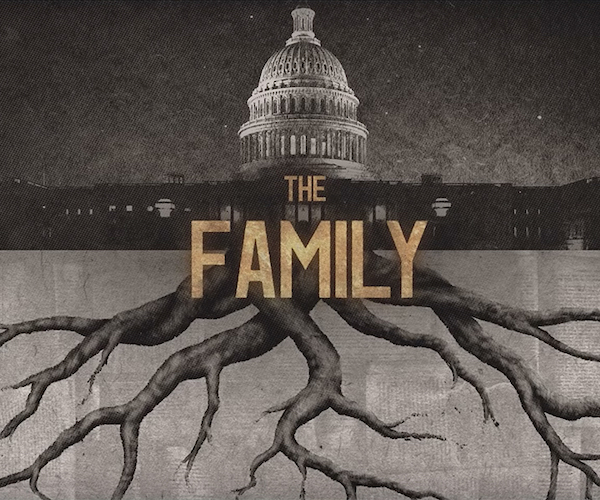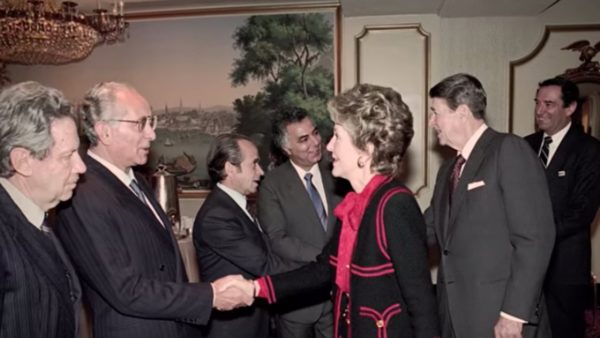Television Review: “The Family” — Ruthlessness and Christian Piety
By Matt Hanson
The documentary sees The Family as really just a huge, secretive, and well-funded lobbying firm: separating church and state is for losers.

As a young man, investigative reporter Jeff Sharlet heard from an enthusiastic former classmate about a place that sounded like a cross between a frat house and a Sunday morning prayer group. It was for young spiritual seekers like himself, who lived together in an exclusive male-only house in Virginia and who played sports, read the Bible, and did some occasional community service for some of the D.C. Belt potentates. Sharlet was intrigued and decided to join in the All-American camaraderie. But the longer he participated, the more he realized that he was on the inside of a group with a larger, more insidious agenda that involved a surprisingly stern reading of scripture. And that it possessed an undercover, world-wide political influence. The Family, the new five-part Netflix documentary based on Sharlet’s bestselling book, traces the lineage of the mafia-like operation.
Doug Coe, a mild-mannered Ned Flanders-like Oregonian, was the influential but spotlight-shunning head of The Family, an organization that not only endorsed a hard-right Christian agenda (while it waved the banner of Christian fellowship), but cultivated power by way of a number of national and international political figures. Generally, Coe preferred to remain out of the spotlight. He always maintained that his motivations were to humbly follow the Bible’s teachings. The official motto of the group was “Jesus plus nothing.” Yet he can be seen grinning, amiably, in the background of photographs taken with every President since Eisenhower. The National Prayer Breakfast in Washington, a weekend-long event run on an invitation-only basis by The Family, served as the ideal opportunity for ambitious politicos to publicly proclaim their faith, do some informal networking, and become involved in religiously motivated statecraft all over the globe.
Sharlet offers plenty of first-person testimony about his unsettling experiences as a rookie member of The Family. What makes his account trustworthy is how matter of fact he is; he doesn’t seem to be especially bitter or vindictive. If anything, he’s slightly awed by how efficient the group is in achieving its goals, even while the ostensibly Jesus-based ideology starts to sound more cultish than anything else. He recounts how Bible study classes quickly became tutorials in Calvinist predestination; contrary to what one might expect from Bible-thumpers, it turns out that it doesn’t really matter how moral you might be — if you’re on the team, then you’re in good graces no matter what.
The Old Testament story of King David is used as a case in point, David was blatantly immoral when he hooked up with the nubile but married Bathsheba and then arranged to have her husband killed in battle so that he could have her all to himself. But, being the apple of God’s eye as well as a divinely-appointed king, The Family argues that we should just forgive and forget his little indiscretion. The most important trait one can have is loyalty to God, which is explicitly conflated with organization’s mission. In some disturbing archival footage, we see Family heads giving speeches that praise the blood-oaths of fascism and Maoist revolution, seeing them as examples of how committed one must be to the mission. As it turns out, the motto “Jesus plus nothing” really means “Jesus” in terms of The Family’s narrow, authoritarian definition and “nothing” is all that is permitted to be thought, done, or said in his service. Bibles are literally swapped out for smaller, bowdlerized pamphlets with carefully selected quotations about the benefits of teaming up with the powerful and devoting oneself utterly to the cause.
All this fervor would ultimately amount to general run-of-the-mill fundamentalism if The Family didn’t have real political influence to exploit. Two prominent Republicans, former South Carolina Governor Mark Sanford and former Nevada Senator John Ensign, rose to prominence as strong “family values” advocates through The Family’s support. They had news-making affairs that were quickly covered up or swept under the rug. Ensign’s former close friend, whom he repeatedly cuckolded, speaks candidly about how his personal hell became a public flaming. A depressing lack of accountability or oversight was shown by the very people who talked the biggest game about morality. Sanford is probably the most famous example because of his apparent disappearance, supposedly hiking the Appalachian trial. He was discovered in the arms of his Argentinean mistress. Sure enough, not long after he gave his po-faced public apology, where he committed the ultimate sin by naming some secret Family members, Sanford was given some impromptu coaching and began citing the story of David and Bathsheba in his defense.

A scene from “The Family:” Photo: Official Trailer, Netflix
Essentially, The Family is shown in the documentary to be no more than a huge, secretive, and well-funded lobbying firm. Sure, the ostensible message is about helping others along on their humble walk with Christ. But actions speak a lot louder than pious words. The Family didn’t have much squeamishness when it came to working with and supporting dictators, strongmen, and fiercely right-wing parties worldwide, including an anti-gay marriage vote in Romania that ultimately failed. Whenever this moral complexity is brought up to one of the group’s advocates (and an impressive number are willing to talk on the record) they always use the same response — we’re just trying to follow Christ by welcoming people in the spirit of brotherhood, so why shouldn’t we work with shady characters? This all-too-convenient rationale exposes the hypocrisy at the heart of the Family. Someone who throws dissidents in jail and a thrice-married adulterer who boinks porn stars can be redeemed. But a gay couple tying the knot? That is an intolerable blasphemy.
The film somewhat underestimates a crucial insight about how Americans really view religion in its effort to convey the Family’s genuinely creepy mob-like aspects. The rank opportunism on display here isn’t all that different from any number of lobbying firms that raise truckloads of money for the sake of glad-handing politicians, who end up becoming not so secret emissaries all over the world on behalf of whatever issue. Towards the end, Sharlet analyzes the Family’s breathtaking combination of ruthlessness and piety — they openly believe in promoting and enforcing their rigidly dogmatic view of gentle Jesus’s teachings by any means necessary. Separating church and state is for losers.
This moral schizophrenia may be shocking to some, but that mercenary attitude is in lockstep with the transactional, market-oriented, capitalist mentality Americans have been marinating in since birth. Maybe our cavalier attitude to corporatized religion is because of our relative youth as a nation. We don’t have the perspective that comes from having survived centuries of religious warfare, such as bloody conflicts that rampaged through Europe since the Middle Ages. But based on the number of times these sleazes get elected and reelected, as both Sanford and Ensign did (albeit to relatively lower positions), it appears that Americans are not all that shocked at how groups like the Family connect the dots between political tribalism and holy zeal. In the end, if you’re on board with the agenda already, what difference does a little hypocrisy make? As long as your team wins in the end, it’s really just another day at the office.
Matt Hanson is a critic for The Arts Fuse living outside Boston. His writing has appeared in The Millions, 3QuarksDaily, and Flak Magazine (RIP), where he was a staff writer. He blogs about movies and culture for LoveMoneyClothes. His poetry chapbook was published by Rhinologic Press.
